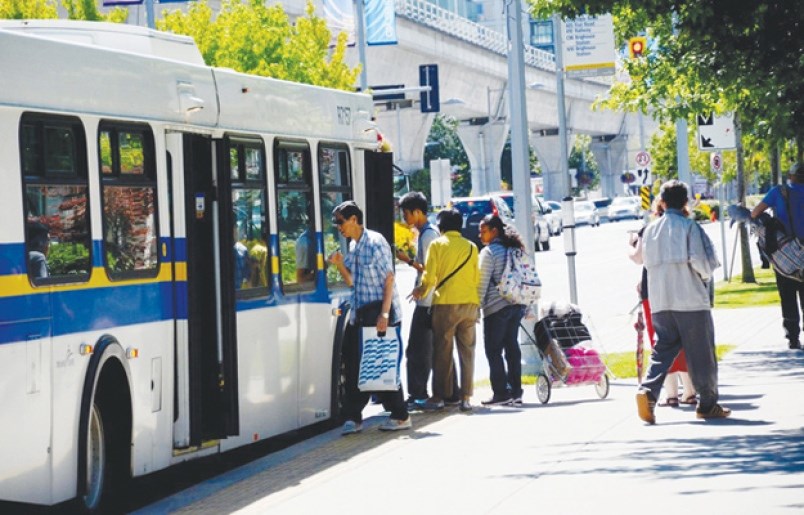Transit commuters should note Labour Day will mark the beginning of a number of changes to Richmond’s bus network at rush hour.
According to TransLink, three major Richmond bus routes are getting increased weekday service.
The 402 (Two Road/Richmond-Brighouse Station) will increase service to every 10 minutes, from every 12 minutes, between 7-8 a.m.
The 403 (Three Road/Bridgeport Station) will see the same increases between 7-9 a.m., as well as 4-6 p.m.
And the 401 (One Road/Richmond-Brighouse Station) will now run every eight minutes, from every nine minutes, between 7-9 a.m. and 5-6 p.m. Additional buses during off-peak hours are also being added to the route, which will also undergo changes. The 401 will continue to be called the 401 between Steveston and Brighouse station, however it turns into the 408 eastbound from City Centre, as it heads down Garden City Road to Ironwood or Riverport.
The changes are part of increased funding to TransLink, via the Mayors’ Council’s 10-year transportation plan that envisions a new light rail line in Surrey and Broadway subway link in Vancouver.
Meanwhile, the 410 bus route is being overhauled and split in two, like the 401/408. The 410 presently runs from Steveston, via Railway Avenue, to 22nd Street station (Expo line) in New Westminster, via Cambie Road.
The 410 will now change back to a familiar number for long-time residents – 406 – for its route between Steveston and Brighouse station, via Railway and Granville avenues. The frequency of this bus will be decreased, however, as buses running every 5-9 minutes in the morning (7-9 a.m.) will now run every 7-9 minutes. When the bus runs between Brighouse station and New Westminster, it will maintain the 410 number.
TransLink said the 401 and 410 routes are being split to improve speed and reliability (avoiding backups through City Centre that could disrupt the entire line).
Additionally, regular weekday service on the 480 is returning for students attending University of B.C. During peak morning and evening times, the bus will run every 7-10 minutes.
Of note, buses labelled with a ‘C’ will no longer be labelled as such. Thus, the C92 is now the 412; the C93 is the 413; the C94 is the 414; the C96 is the 416; and the C98 is the 418. And effective mid-fall, the 418 will be extended down Blundell Road to Zylmans Way, to service the industrial areas of East Richmond.
These changes are the first of many that could come to Richmond bus routes over the next decade. TransLink has tentatively approved route changes to the 402, 404, 405 and 407. Many of the changes are intended to disperse buses to different Canada Line stations and add service to roads that do not have it. For instance, the 402 may be diverted from turning on Blundell Road and run up No. 2 Road (past Blundell where there is no bus) to the Olympic Oval and end at Aberdeen Station.
Presently under construction is a new bus loop at Brighouse station, which should mean buses needn’t park on No. 3 Road. A Steveston exchange has been identified as a needed facility.
The most significant additional service to come to Richmond over the next 10 years (TransLink claims a “1-15 year implementation”) will be a B-line from City Centre to Metrotown, directly connecting Richmond to the Expo line and Burnaby. And if and when the 402 is diverted a new bus along Blundell Road will be added.
The 10-year vision also calls for: “Upgrade capacity” to Canada Line “through the purchase of new rail cars to provide more service, upgrades to stations, and expansion of facilities.”
Canada Line capacity is presently handicapped by past decisions to single-track the line to Brighouse station and building shortened platforms. In the short-term TransLink has ordered 12 new trains to be in place by 2020. Peak frequency on the main line (from Bridgeport station to Waterfront station) will increase from three minutes and 20 seconds to two-and-a-half minutes.



